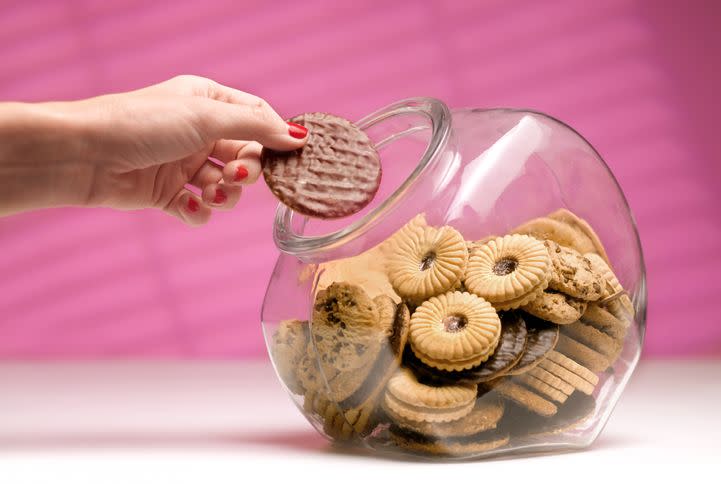Why you might be feeling bloated right now

There's no denying that we're in a time of change, it's all anyone can talk about. The current pandemic has impacted our jobs, our social life and even our cooking, but what about its effect on our bodies?
You might have noticed that you've broken out, that your teeth ache or that you've been feeling more consistently bloated than ever before. Could it all be linked to the situation we're all currently experiencing?
We asked the experts what being inside can do to our bodies and how we can help to combat these effects at home.
This is what's happening to your body right now...
Your weight
Stress, whether acute or chronic, can impact the health and efficacy of our immune system, digestive function, hormone balance, mood and weight, so we spoke to nutritional therapist, Clarissa Lenherr to find out what's really going on.
What's really going on inside our body right now?
'Anxiety and stress can trigger digestive symptoms for many, and bloating is one of the most common digestive health complaints. When we are anxious or stressed, our body actually diverts resources and blood flow away from the gut to our heart, brain and muscles. This reduced energy and blood flow to the digestive system can slow our digestive system down. When we eat in this state, we take much longer to digest our food, which can leave us feeling full and bloated.'
'Additionally, when we are stressed or anxious, many of us can reach for highly palatable foods as a distraction or pick-me up. These foods tend to be those that are filled with sugar, refined carbohydrates and potentially unhealthy fats such as crisps, chocolate bars, cookies etc. And these kinds of foods can trigger bloating in susceptible individuals.'
Clarissa goes onto explain: 'In response to perceived or experienced stress, our adrenal glands (located above the kidneys) secrete cortisol, one of our stress hormones. This is a biological response that is designed to help us respond to threat and danger. Whilst it is normal to have a certain amount of cortisol in the body, an excess amount of this stress hormone can lead to problems such as hormone imbalance, bloating, weight gain, lowered mood and fatigue.'
There are a number of mechanisms at play when it comes to the relationship between stress and weight gain/bloating:
Firstly, when we are under stress, healthy eating habits can be difficult to maintain. From reaching for fast food choices due to time constraints to eating to fill an emotional need, these choices can have a cumulative effect on our weight and our feeling of bloating.
Secondly, elevated cortisol has a two-fold effect on our body weight and fat. When stress first occurs, our bodies prep and enter that fight or flight mode, and fat is broken down to supply the body with rapid energy. Theoretically, we should have been burning energy throughout this stressful moment – either running from or fighting that impending lion attack. However, with modern stress, we often have no need to expend energy, and instead we just feel stressed. Yet, most of us, after a stressful episode, will find we have an increased appetite, even though we have used no energy.
Sustained low grade stress often leads to chronically elevated levels of cortisol which promotes an increase in appetite and glucose production. When we have elevated glucose, insulin, the hormone responsible for curbing blood glucose, also becomes elevated.
Overtime this can lead to insulin resistance, which in other words means our bodies become desensitised to insulins effects, and we end up needing more insulin to do the same job. Together insulin resistance and high levels of glucose promote the conversion of glucose into fat as a stored energy mechanism. Often this fat accumulates in the abdominal region as this area is more sensitive to cortisol and insulin and is the preferred area for storing fat.
So, what can we do?
All is not lost. Here, Clarissa shares seven tips on how to take charge of your weight during a pandemic:
Eat Mindfully
When we don’t pay attention to the foods we eat, we often end up over-eating. This is partly down to the fact that when we aren’t focused on eating, our bodies hunger and satiety hormones aren’t as primed and receptive and end up taking longer to kick in and tell us we are full/satisfied. Think of those times when you have made your way to the bottom of the popcorn bag in the cinema, without even a second thought to how much you’ve munched through. Try to avoid using your phones, watching TV or doing emails at meal times.

Breathe
Take a few deep breaths before eating a meal. If we eat in a stressed state, our digestive systems won’t be functioning at full capacity. This can impact not only our appetite but also our digestive health and may leave you with bloating, stomach cramps or reflux.
Aim for well balanced meals when possible
It’s not always easy when we are time poor or stressed to whip up meals from scratch, but try the below to ensure you have something to hand to grab that will keep you full and fuelled without the hit of carbohydrates or sugar that will only make weight gain inevitable.
Batch cook on a day which is less busy, whip up twice as much of your favourite meal and keep it in the freezer to microwave or in the fridge to grab.
Keep chocolate in the freezer. Out of sight, out of mind. Plus, most of us won't chomp through a whole bar of freezing chocolate straight away. Take a square, let it defrost, and then enjoy.
Reach for low Glycaemic index berries such as blueberries/raspberries if you need a sweet kick. The antioxidants in berries will help offset some of the oxidative stress whilst giving you a touch of natural sugar and vitamins.
Your skin
Lots of people are reporting break-outs and changes in the texture of their skin, so what's really going on?
'The stress and uncertainty surrounding Covid-19 can play havoc on our skin,' explains Dr Ophelia at The Cranley Clinic. 'The mind and the skin are connected on many different levels and we often see the emotions expressed through the skin - just as it is often expressed through gastrointestinal symptoms, increased anxiety or hypertension.'
So, what can we do?
Managing the impacts of stress on the skin is a multifaceted effort. Try to get as much sleep as possible, exercise as much as you can given the circumstances and consider meditation or deep breathing. There isn't one right answer for each person but there are different things that will work well for each individual - depending on their stress triggers.
How can we combat spots?
When you’re faced with a stressful situation, your body releases stress hormones, including cortisol, which may increase the skin’s oil production. Increased sebum - or oil - production can, in turn, trigger spots and acne.
'There is no cure as such for acne, but the symptoms and side effects of acne such as oil and spots can be controlled so your skin can be clear and spot free by effectively clearing the dead skin, controlling the oil and killing the bacteria,' Dr Ophelia tells Red Online.
Here are her eight top tips on how to minimise skin damage and breakouts:
As with any acne breakout it's important to use a gentle cleanser in the morning and evening.
Avoid harsh exfoliation and chemicals which can exacerbate sensitive skin.
Follow your cleanser with a hydrator and a broad-spectrum SPF throughout the day.
Use simple products that target oil production, cleanse the skin and restore a healthy skin barrier function and normal skin cycle.
By adding in Retinols, you can also improve the texture of skin including acne scarring by helping with the production of fresh skin cells.
Being self-aware can help too. Some people find that they pick their spots as their anxiety increases and, by removing this trauma to the skin, the skin can start to heal.
Relaxation can go a long way in treating the physical symptoms that are visible on the skin too.
Try incorporating breathing exercises into your routine. This can have a very positive and powerful impact in improving the skin condition.
Why is my skin so dry?
Even if you are adhering to your normal skincare regime, you might be finding that your skin feels and looks drier than normal.
This is because 'central heating and over-washing can cause irritant dermatitis or cause flare-ups of eczema,' Dr Ophelia explains.
'Use regular emollients to protect the skin, stay hydrated and replenish your body with water to avoid suffering with dry skin throughout this isolation period.'
Your hair
You might have noticed that your hair feels dull and limp since you've been inside more, or perhaps it feels as though more hair is falling out as you brush?
'Stress and hair loss can absolutely be related,' Dr Rekha Tailor of the Health & Aesthetics Clinic explains. 'When the body is under stress, nutrients that your hair requires are often redirected to other areas of the body and, as a result, people can experience a number of symptoms such as thinning hair, alopecia and dry or tight scalps.'

A lack of sleep and restless nights, as a direct result of the stress surrounding the current pandemic, can cause issues with the hair and scalp. 'Sleep is nature’s medicine' and a vital ingredient in the replenishment stage of skin and hair renewal.
Another symptom of stress and anxiety is the repetitive pulling and scratching of the scalp. Termed trichotillomania, some people find that they have an irresistible urge to pull out the hair from their scalp, eyebrows or other areas of their body when suffering from severe stress. This in turn results in permanent damage to the follicle and, in extreme cases, premature hair loss. Hair pulling can be a way of dealing with negative or uncomfortable feelings, such as stress, tension, loneliness, boredom or frustration.
Dr Rehka goes on to explain why stress can also cause you to lose hair: 'Severe stress is also linked with conditions such as alopecia areata — a condition from which the body’s immune system attacks the hair follicles, causing hair loss. There’s a full-circle pattern that often forms whereby people experience more stress as a result of the condition which then can worsen the symptoms.'
So, what can we do?
'The key to looking after your hair throughout these stressful times is to look at coping mechanisms that work for you. Relaxation can go a long way in treating the physical symptoms — whether it’s meditation techniques, reading a book or a gentle walk in the countryside. Eating a healthy diet can go a long way too.'
Your teeth
Many people will have noticed that their teeth feel different suddenly, with lots reporting an aching.
'You might find that you’re grinding or clenching your teeth a lot more often than usual,' Dr Sunny Sihra, Dentist and owner of the SimplyTeeth Clinic explains. 'If this is the case you might be suffering with a condition called Bruxism.'
Bruxism is essentially where people clench their teeth for periods of time during the day, as well as grinding them at night, this is more commonly known as sleep bruxism. Stress can cause constant worrying and thinking, which can affect your body when it’s asleep and cause you to grind your teeth. The symptoms of Bruxism are increased tooth sensitivity and a decrease of enamel on the tooth, Jaw soreness and tight jaw muscles, loose or chipped teeth, a headache that is focused around the temples and grinding your teeth loud at night.
And stress doesn't just cause us to clench our jaws, it also impacts the bacteria in our mouths:
Stress can affect your immune system which fights against the bacteria that causes periodontal disease making a person more susceptible to oral infection, inflamed and bleeding gums and eventually gum disease.
You may also find if your stressed, anxious or even working from home your diet may slip. Having a poor diet is usually associated with stress, with people most likely wanting to eat quick and easy foods meaning they won’t be getting the proper vitamins and nutrients they need to be healthy.
A bad diet can naturally lead to teeth troubles, especially if you are consuming more caffeine than usual, some of which will be yellowing of the teeth, a larger alcohol consumption and sugary drinks promoting teeth cavities, as well as plaque build-up if you find you’re not brushing or flossing your teeth as much as you normally would.
So, what can we do?
The main thing you need to do to help prevent any of the above is to try and look after your oral healthy as best as you can and treat it like any other aspect of your health.
'A lot of times oral health comes second or third behind our general health, mental health and wellbeing however it’s imperative to ensure you are still brushing twice a day and flossing if you can,' Dr Sunny advises.
'Try to keep your normal routine in place, brush your teeth first thing before you settle into work, I would suggest getting a mouthwash and floss to ensure you are covering all areas.'
Subscribe to Red now to get the magazine delivered to your door. Red's May issue is out now and available for purchase online and via Readly or Apple News+.
Like this article? Sign up to our newsletter to get more articles like this delivered straight to your inbox.
SIGN UP
[editoriallinks id='62db5590-a90e-4f35-9c77-d298a6ccce0d'][/editoriallinks]
You Might Also Like




